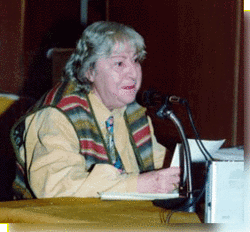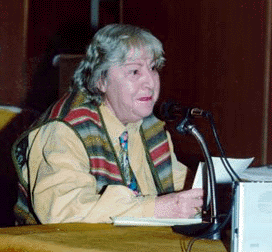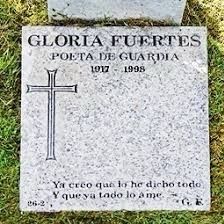Author. Gloria Fuertes received fame as a 20th century Spanish poet and author of children's books. She was part of the first generation of Spanish poets to come into prominence after the Spanish Civil War of the late 1930s. Her named is linked with the Spanish literary movement called "The Generation of 50." She published 15 books of poetry and 34 children's books before her death in 1998. Born the youngest of eight children of working-class parents in Madrid, she remained in Madrid most of her life. She received her early education in Roman Catholic schools, and started writing poetry and short stories at age 15. She attended the Institute of Vocational Education of Women, where she studied shorthand and typing along with childcare. After graduation, during the Spanish Civil War, she was a bookkeeper in a munition factory. She married but her husband was killed in the war. It was at this point, with her grief and nearly starving to death, that she decided to become an author. At the end of the war, she published her writings and read her poetry on the radio. Becoming recognized as an author, she became part of the Madrid literary group, which was her support system. In 1950 she published her first book of poetry, "Isla ignorada." She is remembered for her other works including "Aconsejo Beber Hilo," "Todo Asusta," "Ni Tiro, ni Veneno, ni Navaja" and in 1969 "Poeta de Guardia," which is considered one of her best works. She received many awards for her poetry including 1st place in the International Hispanic Lyric Poetry Contest for her 1958 "Everything scares Caracas;" the Guipúzcoa Award for her 1965 "Neither Shot, nor Poison, nor Razor;" and 2nd place in the Vizcaya Prize for her 1969 "How to Tie the Tiger's Whiskers." After learning English, many doors were opened with her accepting a position at a public library. In 1952, she published her poetry journal, "Arquero." She published four stage plays from 1942 to 1978. She received a Fulbright grant in 1961 to teach Spanish at Bucknell University in Pennsylvania for three years. After returning to Spain, she taught Spanish as a second language to foreign students at the Madrid's International Institute. Her children's book in 1968, "Kangaroo for Everything," was an honorable mention in the Hans Christian Anderson Prize for Children's Literature. In the 1970s, she also began appearing on children's programs on Spanish television and was voted both the best writer for children literature. Upon the centenary of her birth in 2017, the recognition of her role in Spanish poetry as a whole during the 20th century has rallied greatly. Besides being an advocate for gender equality, she was against war and supported the healthy environment.
Author. Gloria Fuertes received fame as a 20th century Spanish poet and author of children's books. She was part of the first generation of Spanish poets to come into prominence after the Spanish Civil War of the late 1930s. Her named is linked with the Spanish literary movement called "The Generation of 50." She published 15 books of poetry and 34 children's books before her death in 1998. Born the youngest of eight children of working-class parents in Madrid, she remained in Madrid most of her life. She received her early education in Roman Catholic schools, and started writing poetry and short stories at age 15. She attended the Institute of Vocational Education of Women, where she studied shorthand and typing along with childcare. After graduation, during the Spanish Civil War, she was a bookkeeper in a munition factory. She married but her husband was killed in the war. It was at this point, with her grief and nearly starving to death, that she decided to become an author. At the end of the war, she published her writings and read her poetry on the radio. Becoming recognized as an author, she became part of the Madrid literary group, which was her support system. In 1950 she published her first book of poetry, "Isla ignorada." She is remembered for her other works including "Aconsejo Beber Hilo," "Todo Asusta," "Ni Tiro, ni Veneno, ni Navaja" and in 1969 "Poeta de Guardia," which is considered one of her best works. She received many awards for her poetry including 1st place in the International Hispanic Lyric Poetry Contest for her 1958 "Everything scares Caracas;" the Guipúzcoa Award for her 1965 "Neither Shot, nor Poison, nor Razor;" and 2nd place in the Vizcaya Prize for her 1969 "How to Tie the Tiger's Whiskers." After learning English, many doors were opened with her accepting a position at a public library. In 1952, she published her poetry journal, "Arquero." She published four stage plays from 1942 to 1978. She received a Fulbright grant in 1961 to teach Spanish at Bucknell University in Pennsylvania for three years. After returning to Spain, she taught Spanish as a second language to foreign students at the Madrid's International Institute. Her children's book in 1968, "Kangaroo for Everything," was an honorable mention in the Hans Christian Anderson Prize for Children's Literature. In the 1970s, she also began appearing on children's programs on Spanish television and was voted both the best writer for children literature. Upon the centenary of her birth in 2017, the recognition of her role in Spanish poetry as a whole during the 20th century has rallied greatly. Besides being an advocate for gender equality, she was against war and supported the healthy environment.
Bio by: Linda Davis
Advertisement



